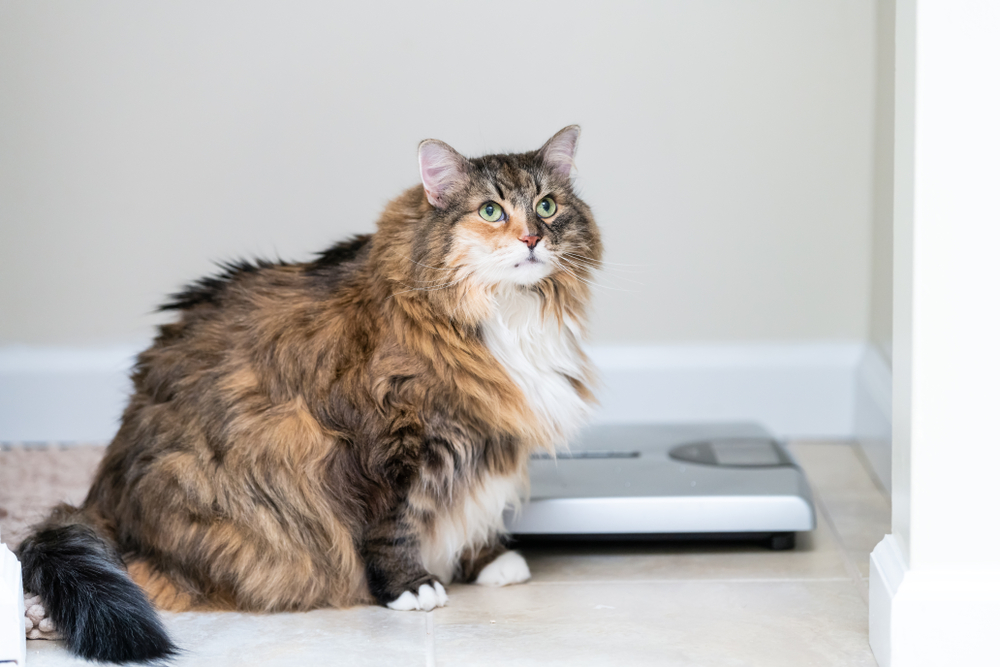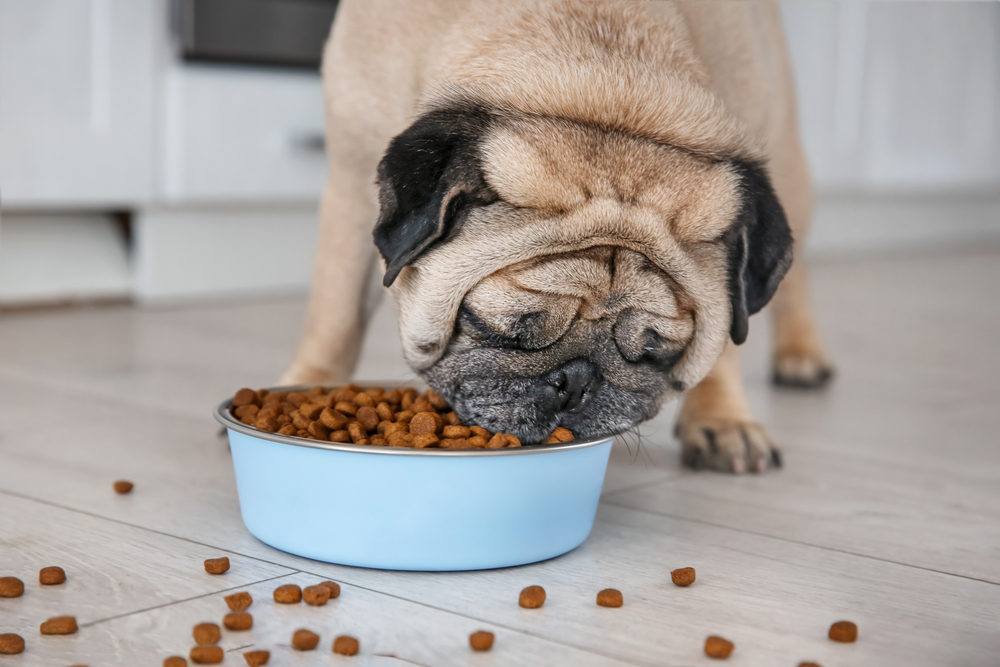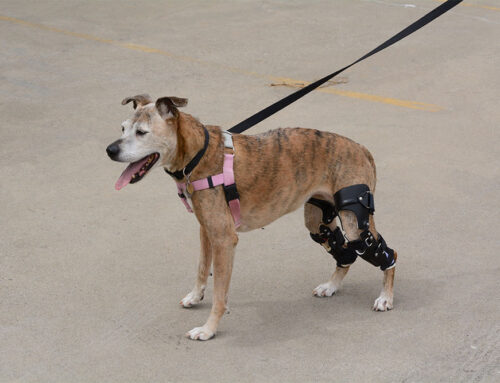These days, you may have difficulty separating fact from fiction, and you may lose sight of pet health facts—especially their weight. Currently, more than half of all U.S. dogs and cats are overweight (i.e., 10% higher than their ideal body weight) or obese (i.e., 20% or higher than their ideal weight)—putting them at risk for chronic health issues and a shortened lifespan. Learn to separate facts from fluff by reading our Livingston Veterinary Hospital team’s guidelines, and putting your pet’s weight in perspective amid the current obesity crisis.
Fluff: My pet is big-boned, fluffy, or curvy
Fact: If you find yourself defending your dog’s or cat’s physique with this funny—but fictitious—quip, get honest about your pet’s health. Excess body weight and obesity are a byproduct of domestication and our modern lifestyles. While rest and recovery are important to pet health, your dog’s or cat’s wild ancestors spent much of their day hunting and foraging for food—burning calories, strengthening their muscles, and maintaining a lean body mass. Their diet and activity were proportional, and so were their bodies. Rather than feeling shame or embarrassment, acknowledge your pet’s obesity as a human-made problem, and recognize your power to reverse their adverse health condition.
Fluff: Overweight pets are robust
Fact: Fat tissue causes inflammation, and an overabundance can trigger degenerative—often painful—body changes. Overweight and obese pets have a higher risk for life-altering issues and chronic health conditions such as:
- Arthritis
- Cancer
- Orthopedic injury and worsening congenital conditions (e.g., hip dysplasia, luxating patellas)
- Diabetes
- Cardiovascular problems
- Kidney disease
- Respiratory issues (e.g., asthma)
- Skin disorders
- Poor healing and immune function
- Endocrine dysfunction (e.g., thyroid or adrenal gland problems)
- Heatstroke
- Exercise intolerance
These conditions’ complications often shorten a pet’s life. According to one study, an overweight pet’s life span is 2.5 years shorter than that of a healthy weight pet.
Fluff: Too many calories and too little exercise cause pet obesity

Fact: Several common health conditions can contribute to or be the primary cause for pet weight gain—making a veterinary examination essential before changing your pet’s diet or exercise regimen. Without your veterinarian’s diagnosis, your attempts to help your pet lose weight may be fruitless or could endanger their health by depriving them of key nutrition. Conditions that can lead to pet weight gain or be mistaken for obesity include:
- Hypothyroidism (i.e., low thyroid)
- Overactive adrenal gland (i.e., Cushing’s disease)
- Fluid accumulation (i.e., ascites)
- Pregnancy
- Abdominal tumor
If your pet has been gaining weight, schedule an appointment with our Livingston Veterinary Hospital team.
Fluff: My overweight pet is lazy
Fact: While some pets are naturally less motivated to be physically active, others may be holding back because of undiagnosed pain or hidden injury. According to a 2019 report, 52% of dogs and 41% of cats with arthritis were overweight. Arthritis is a progressive and degenerative joint condition that restricts your pet’s physical movement because of pain. Arthritic pets learn to avoid pain by reducing their activity, and may alter their behavior (e.g., refusing to move, hiding, growling) to avoid pain-inducing situations such as leash walks, petting, or interactions with rough-playing housemates. If your pet is inactive or disinterested in play, they may be suffering from a hidden condition. An arthritis diagnosis, coupled with pain management, can be an essential part of your pet’s effective weight loss.
Fluff: Cutting calories is a simple and quick way to help your pet lose weight
Fact: Reducing your pet’s food intake without veterinary approval is an ineffective and potentially dangerous strategy. While less food does mean fewer calories, food restriction can also mean less nutrition. If you change your pet’s diet without consulting your veterinarian, they may develop a nutrient imbalance that can lead to serious health issues—especially cats—who may develop hepatic lipidosis (i.e., fatty liver). In addition, calorie-restricted diets may not provide your pet adequate energy, and can leave your pet feeling hungry.
Ask your veterinarian to recommend a personalized food plan for your pet. Many weight-loss foods promote calorie burning while delivering the crucial nutrients your pet needs. Slow-burning complex carbohydrates provide steady energy and help pets feel satisfied.
Fluff: Allow your pet to eat when they want
Fact: Portioning your pet’s daily calories into several smaller meals is a healthy and effective way to feed them for weight loss. Free feeding (i.e., grazing)—making food available to your pet all day—prevents you from accurately monitoring their food intake, encourages overeating, and may cultivate picky eating habits, causing them to beg for table scraps. Meal feeding ensures that your pet receives their precise calorie allotment, and accelerates their metabolism by promoting scheduled eating. When transitioning to meal feeding, make your pet’s food available to them for 20 to 30 minutes. If your pet does not eat during that period, remove the uneaten portion and offer food again in a few hours. Gradually shift the scheduled meals to suit your schedule.
Fluff: Breed-specific weight ranges accurately determine your pet’s healthy weight
Fact: A purebred pet’s individual size and conformation (i.e., structure) vary greatly, making breed-based weight assessments unreliable—especially in terms of health-related matters. Evaluate your pet as an individual by measuring their body condition score. You should conduct this easy assessment monthly to monitor changes in your pet’s weight, and determine if their feeding and exercise routine are appropriate. If your pet scores higher or lower than the ideal range (i.e., 4 to 5), you should schedule an appointment with your veterinarian.
An enormous amount of information—fact, fluff, and otherwise—is available to every pet owner. But your pet’s health and wellbeing are not meant to be crowdsourced. If you are concerned about your pet’s weight, contact your trusted Livingston Veterinary Hospital team to determine whether an adverse health condition is causing their weight gain or to help your dog or cat lose weight, and regain their quality of life. For additional weight management facts, check out our previous blog post on safe pet weight loss.







Leave A Comment